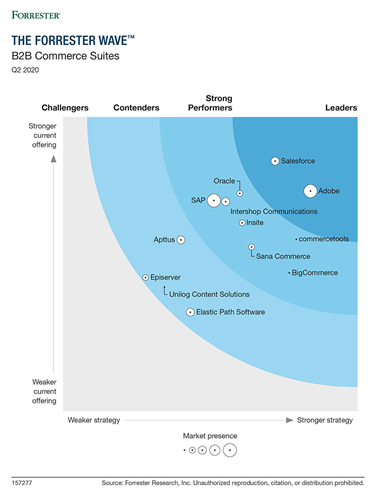
30 December 2020
Magento Commerce B2B vs Bigcommerce B2B
Admin
B2B
What is the best B2B commerce platform?
Traditional eCommerce is Business-to-Consumer (B2C) where a retail store provides products directly to consumer. When a wholesaler sells their products to retailers or manufacturers, this is called Business-to-Business (B2B).
Traditional eCommerce is Business-to-Consumer (B2C) where a retail store provides products directly to consumer. When a wholesaler sells their products to retailers or manufacturers, this is called Business-to-Business (B2B).
Frost & Sullivan expects that B2B ecommerce will hit $6.6 trillion by end 2020. In a 2020 survey, 41% of B2B retailers expect to grow their online channel by more than 25% this year.
In this article today we will battle two great commerce platforms who offer B2B functionality… Magento Commerce and Bigcommerce.
FIGHT!
SaaS v PaaS
BigCommerce is a SaaS cloud-based solution and Magento is a PaaS open source solution.
SaaS (Software as a Service), also known as “Cloud”, utilises the internet to deliver applications which are managed by a third-party vendor. The key advantage of SaaS is that it reduces the time and money spent on installing, managing, and upgrading software. SaaS products though generally offer minimal customisation and lack of control.
PaaS (Platform as a Service) delivers a framework to build upon and to create customised applications. All servers, storage, and networking can be managed by the enterprise or a third-party provider while the developers can maintain management of the applications.
Magento’s open approach is key to merchants being able to deliver differentiated commerce experiences and Magento has an extensive ecosystem which is a core differentiator and source of continued innovation.
Magento is also open source so allows complete flexibility and customisation. This is why Magento is typically the go-to for scalability and flexibility.
SKU (Stock Keeping Unit) volume
Bigcommerce says that it “empowers your team to build sleek site designs for large catalogues, with customer and pricing segmentation down to the SKU level.”
Bigcommerce though has a maximum SKU per product limit of 600. If you have a large catalogue or plan to grow your business, choosing a platform with SKU limits essentially restricts the upside of your business.
Magento on the other hand does not impose any product limits. Magento can theoretically handle millions of SKUs though anything over 300,000 will require infrastructure investment and optimisation.
Core B2B functionality
Bigcommerce B2B is a suite of 3rd party add-on applications that are pre-integrated with BigCommerce’s core platform. You will need to pay for these services on top of your subscription (eg apruve, brightpearl, bundleb2b, punchout2go, etc). Apruve is required for lines of credit and bundleb2b for corporate account management, bulk orders, etc. In other words lots of what should be standard in an enterprise B2B platform is not and requires additional paid services.
True B2B is unfortunately not included with Bigcommerce plans.
Magento’s included B2B features include:
Company accounts with multiple buyers in tiered organisational structures
Self-service tools to manage buyer roles and permissions
Full order, quote, and invoice tracking for buyers across the company
Automated order approval process based on rules set by each company
Online sign up for new company accounts
Quick order forms and list uploads for buyers who know exactly what they want
Saved shopping lists to make repeat purchasing even easier
Fast reordering from previous orders with just a couple of clicks
Seller-assisted shopping for sales reps to place orders for customers or troubleshoot issues
Seamless request-for-quote process for online deal negotiations
Punch-out support using partner extensions to serve customers buying from eProcurement systems
Customer-specific catalogs and pricing to reflect negotiated contracts
Multi-site support to tailor experiences for different brands, audiences, channel partners, or geographies
Targeted content and promotions that personalise each visit and boost conversion
Drag-and-drop merchandising and content tools to create compelling sites without the help of IT
Flexible fulfilment with support for shipping and in-branch pickup
Gartner B2B review
Gartner have concerns with Bigcommerce B2B saying it “still lacks natively some of the more complex customer management functionality. It doesn’t natively support the ability for clients’ customers to set up or manage their departments and cost centers, or create workflow for approvals, budgeting or support/sub-user accounts. It also does not support clients’ abilities to manage their customers’ spending and available credit.”
From the 2020 Gartner Magic Quadrant for Digital Commerce, Adobe/Magento is a LEADER while Bigcommerce in comparison is lacking in vision and ability to execute.

Forrester Wave B2B review
Adobe/Magento was also named a LEADER in The Forrester Wave B2C and B2B Commerce Suites. They said “Magento Commerce has an above-par, large, loyal, and highly capable delivery ecosystem that Adobe engineering is harnessing to increase its development velocity.”

Adobe’s top scores were in the criteria of:
Personalization (5 out of 5) – top score
Product Vision & Roadmap (5 out of 5)
Delivery & Extensibility Ecosystem (5 out of 5)
Sales Channel Support (5 out of 5) – top score
Again with B2B Adobe/Magento are LEADERS while Bigcommerce has a weaker current offering and weaker strategy.
Conclusion
While Bigcommerce is making some progress in the B2B space it still lacks natively some of the more complex customer management functionality and true B2B is unfortunately not yet included within Bigcommerce plans.
WINNER: Magento Commerce
Magento/Adobe is a B2B Gartner and Forrester Wave leader allowing compete customistion, flexibility and scalability and is the clear winner today in the battle of B2B commerce.
For consultation on your B2B digital transformation contact acidgreen today.
Need help setting up your e-commerce website?
Contact Us